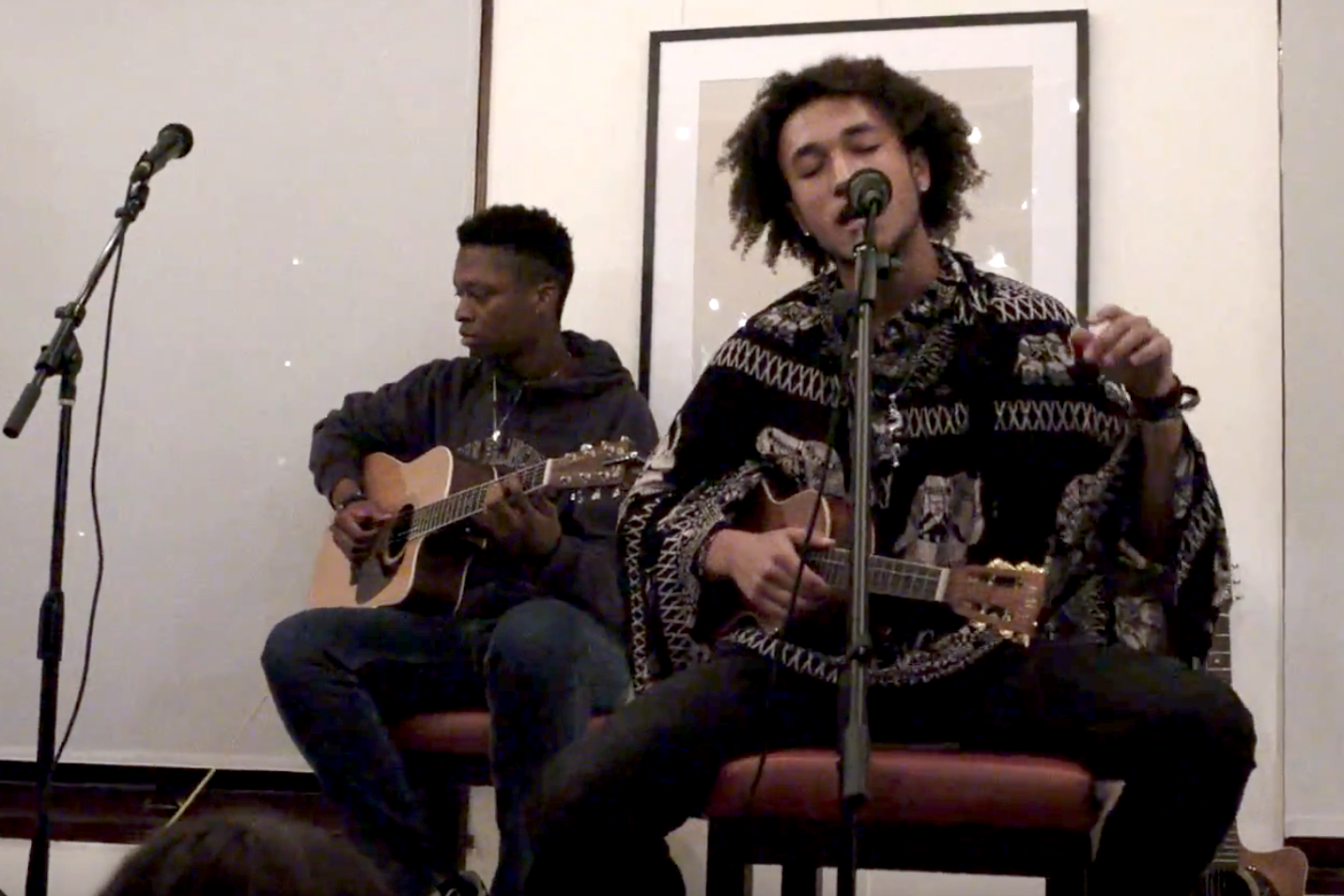An acoustic guitar, electric guitar and bass are propped against the wall. String lights are strung across the Mars common room; a miniature disco ball is suspended from the ceiling, sparkling.
The eclectic mix of instruments, festive wall decorations, voices and laughter uncharacteristically lively for Week 9 gave the Music @ Mars showcase on Nov. 20 a promising outlook even before the show started. The performers were among the waiting crowd, chatting and sitting with their friends, indistinguishable from anyone else in the room. After all, this show was focused on Stanford students — our peers — who, in addition to attending classes, studying and participating in extracurriculars, also compose, produce and perform their own music.
The showcase began with words from Elizabeth Gray ’20, a student staff member at Mars and one of the organizers of the event, who emphasized the dedication of these musicians for pursuing their songwriting, especially at a place as busy as Stanford. Unlike previous showcases, this show was unique in that the performers would be performing only their personally written music — no covers. This was a particularly meaningful move to make on the part of the event’s organizers, as independent artists often feel as though they have to utilize the popularity of other songs to literally have their voices heard.
The show began with Cam & Marco, a rap/hip-hop duo with a celestial sound. Obviously very close friends, the pair had an amazing stage presence, engaging well with the audience and splicing their songs with hilarious ad-libs. Each rapper’s skill and flow were demonstrated well in their song “Waves,” which really came alive with their energy and movements. Their lyrics captured the tension and conflicts of interest that pervade being labeled a “high achiever,” and battling other’s expectations with a sense of personal authenticity. Their down-tempo song “Emotions” conveyed a softer side, with low vocals that impressed the poignancy and longing of the enigmatic chorus, “I want to get back there someday.”
Before his set, Eli Feier ’20 admitted it was his first time performing, yet he did not disappoint in the slightest. His song “Smell Ya Later (Moving On)” treads the grounds between R&B and spiritual low-fi, featuring smooth vocals from young alum artist Ava Madison ’19. After the song, Feier switched to an acoustic guitar, explaining that he begins most of his compositions this way, either with just a guitar, piano or ukulele, and that his next song was still under production. Even while unfinished, the bare-bones “Love Night Stands” was equal parts haunting and humorous, laced with double-entendres that offset a melancholy story of unrequited love. Feier’s presence and musical style were completely raw and authentic, and had the audience slowly swaying to the sound of his voice.
Aniea Essien ’20 has a sound that is very soulful and experimental — her song “Hello” featured voicemail samples that were actually a part of a social experiment for one of her classes at Stanford. Seeming shy by nature, Essien really blossomed while performing, belting out remarkable high notes in a clear, lovely voice, with a soft, baby doll-esque tone vaguely reminiscent of Melanie Martinez. Throughout “Hello,” the listener can faintly hear the sound of a phone number being dialed, undergirded by a mid-tempo clapping beat, with Essien vocals layered on top of itself, imbuing her singing with an evocative, almost omni-present quality. Essien employed voice modulation, creative sampling and electronic elements throughout her works, garnering much praise from the audience with her unique and ardent style.
Jacob Eisenach ’22 — also known as Eisenach — is a prolific Stanford artist whose songs grace topics from “pseudo Marxism on the internet” to human relationships. His style can best be described as a mix of indie rock, post-punk revival and a dash of power pop, with uptempo songs and high-energy vocals. Eisenach utilized a drum machine, electric guitar and even a kazoo during his set, dazzling the audience with his unpredictability. Eisenach prefaced his song “Google Earth” by giving a “shout-out to graphic information systems in general,” perfectly encapsulating his quirkiness. At one point during his performance, he moved away entirely from the mic, giving the song a particularly personal edge.
The last performer was electronic soul singer Clarissa Carter ’19 M.A. ’20. Carter has a lot of experience in both the music industry and in song composition, having opened for artists such as Wiz Khalifa, T-Pain and Kehlani, and put out several albums since she first began writing music at 13. Like the other artists, Carter utilized a wide variety of instruments during her performance, including a trumpet and bass. In contrast, her song “Speechless” used only a couple of strings on an acoustic guitar and Carter’s voice, providing a particularly base sound that gave life to lyrics that captured the feeling of romantic infatuation.
I think the most impressive facet of the Music @ Mars showcase was how much creativity and willingness to experiment these performers brought into their craft. Each artist brought their own unique sound to the showcase, and none of their styles were replicated or even could be replicated by another. They’re bold and dedicated, taking both their art and their identities as artists seriously, making it clear to any onlooker that music for them is not merely a hobby or past-time to supplement their academic life at Stanford but rather is a gripping, imperative and inexorable life passion.
Contact Megan Faircloth at meganfaircloth ‘at’ stanford.edu.
